

Students learn more effectively from print textbooks than screens, study says. Screen vs. paper: what is the difference for reading and learning? Introduction It all started with a project at Uppsala University Library in Sweden called ‘Mobile Academics’, where we held seminars on how to use the library’s e-resources on a tablet computer and gave tips on different apps to use when studying.
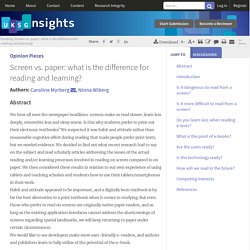
This project led to another seminar about the difference between reading on screen and on paper. Mind the gap: Bridging the divide between discovery and delivery. I wrote in OCLC Next last year about “container collapse” and how many people are having a hard time evaluating the value of online research results.
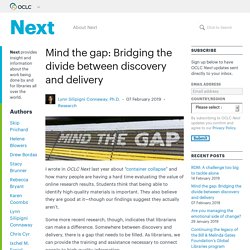
Students think that being able to identify high-quality materials is important. They also believe they are good at it—though our findings suggest they actually aren’t. Some more recent research, though, indicates that librarians can make a difference. Somewhere between discovery and delivery, there is a gap that needs to be filled. As librarians, we can provide the training and assistance necessary to connect people to high-quality information. Importance of the school library in learning — the research. Research shows that school libraries have a positive impact on student literacy and learning outcomes. Read a selection of research reports illustrating the effectiveness of library services that are aligned with the school’s vision and learning goals. School libraries enhance student achievement. - Google Search. Importance of the school library in learning — the research. Cilip ckg diversity review f. Fs45 literacy rates continue rise generation to next en 2017 0.
Bp osi buildingoutstanding. The power of quality research & school libraries with Elizabeth Hutchinson. Research every teacher should know: growth mindset. There is a wealth of psychology research that can help teachers to improve how they work with students, but academic studies of this kind aren’t always easy to access or translate into the realities of classroom practice.
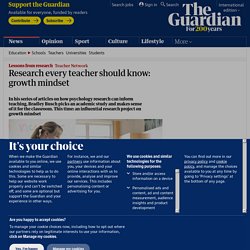
This series seeks to redress that by taking a selection of studies and making sense of the important information for teachers, as we all seek to answer the question: how can we help our students do better at school? This time, we consider growth mindset. Growth mindset – the idea that intelligence can be developed rather than it being set in stone – is arguably the most popular psychological theory in education at the moment.
It was launched into mainstream consciousness after a seminal growth mindset study almost 20 years ago and has since spawned many assemblies and form tutor-time activities. But what were the findings of this influential study? In each, students aged nine to 12 years old completed a problem-solving game. Nicola Morgan. Be the (#edtech) change. Mahatma Ghandi needs no introduction.
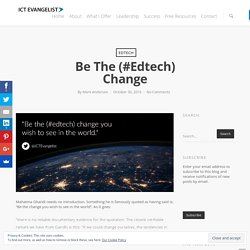
21things - teachwithict.com. Learning Theory.html. <table width=90% cellpadding=10><tr><td bgcolor=ff4447><span><h1>WARNING:</h1><b>JavaScript is turned OFF. None of the links on this concept map will <br />work until it is reactivated. <p><a href=" If you need help turning JavaScript On, click here. </a></p></b></td></tr></table> This Concept Map, created with IHMC CmapTools, has information related to: Learning Theory, zone of proximal development The area of capabilities that learners can exhibit with support from a teacher or peer., organisational learning Nonaka & Takeuchi, Montessori constructivism, Lave & Wenger situated learning, Piaget constructivism, Philosophy Dewey, The church Theology, text & conversation theory An organization is created and defined by communication. communication "is" the organization and the organization exists because communication takes place., Learning Theory Learning Theory v6 is a hypertextual concept map of established learning theories 30th April 2013.
Mélanie McGilloway. Screentime vs reading to your child #TimeToRead. Helicopter Parents – what can schools do? Some parents have always hovered more than others and struggled to trust the school to do its job.
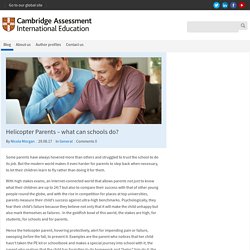
But the modern world makes it even harder for parents to step back when necessary, to let their children learn to fly rather than doing it for them. The Ongoing Importance of School Libraries. Exhausted new parents lose out on over 650 hours of sleep a year. Research finds sleep deprivation is the most stressful challenge about becoming a parent.

Culford School Library. SLR HowWeStudy V20. Download 464 Free Art Books from The Metropolitan Museum of Art Open Culture. You could pay $118 on Amazon for the Metropolitan Museum of Art’s catalog The Art of Illumination: The Limbourg Brothers and the Belles Heures of Jean de France, Duc de Berry.

Or you could pay $0 to download it at MetPublications, the site offering “five decades of Met Museum publications on art history available to read, download, and/or search for free.” If that strikes you as an obvious choice, prepare to spend some serious time browsing MetPublications’ collection of free art books and catalogs. Teachers: Is your school library having an impact on teaching and learning? 4 ways school librarians can effect change. This brilliant diagram demonstrates clearly how a school librarian can make an impact on teaching and learning in schools, but how can you make this happen in your school?
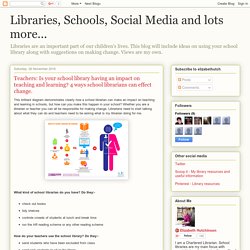
Whether you are a librarian or teacher you can all be responsible for making change. Librarians need to start talking about what they can do and teachers need to be asking what is my librarian doing for me. What kind of school librarian do you have? Do they:- Outcomes Framework Toolkit FINAL. Free Resource: Newseum - We Should Be Teaching Infographics. A couple decades ago or so USA Today did something monumental in the world of news: they made information much more visual.
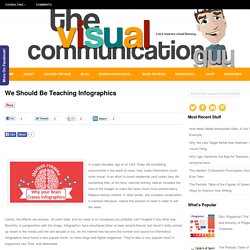
In an effort to boost readership (and sales) they did something that, at the time, seemed entirely radical: increase the size of the images to make the news much more picture-heavy. Reduce textual content, in other words, and increase visualization. It seemed ridiculous: reduce the amount of news in order to sell the news. From WhatsApp to Wind in the Willows: the digital v print debate. Sally Perry ‘All reading can be done on iPads’ At the ATL teachers’ union conference earlier this month the third motion on the final day called for an end to cuts and closures in school libraries.
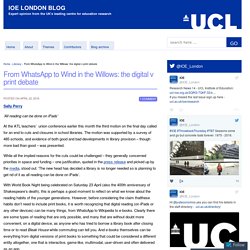
The Positive and Negative Effects of Video Games - Raise Smart Kid. Is playing video games good or bad for you? It can be both. Video games are frowned upon by parents as time-wasters, and worse, some education experts think that these games corrupt the brain. Playing violent video games are easily blamed by the media and some experts as the reason why some young people become violent or commit extreme anti-social behavior. But many scientists and psychologists find that video games can actually have many benefits – the main one is making kids smart. Video games may actually teach kids high-level thinking skills that they will need in the future. “Video games change your brain,” according to University of Wisconsin psychologist C. Below are the good and bad effects of video games – their benefits and disadvantages, according to researchers and child experts: The Benefits: Positive Effects of Video Games When your child plays video games, it gives his brain a real workout.
Quick thinking, making fast analysis and decisions. Multitasking may harm the social development of tweenage girls, Stanford researchers say. MM FinalReport 030510. Media multitaskers pay mental price, Stanford study shows. Stanford Report, August 24, 2009 Think you can talk on the phone, send an instant message and read your e-mail all at once? Stanford researchers say even trying may impair your cognitive control. By Adam Gorlick. Churchill Archive. The 25 Most Popular Passwords of 2015: We're All Such Idiots. TeenTech. 4 technology trends every librarian needs to know. The internet isn’t making us stupid. It’s making us humble. You are sitting across from a friend who asks if you know the capital of Canada. How does your willingness to answer this question change if you have access to the Internet (e.g., via the smartphone in your pocket) or not (e.g., you are hiking in the wilderness with no Internet access)?
That's the question psychologists at the University of Toronto and the University of Waterloo pondered in a paper published in the journal Consciousness and Cognition. Markers of Quality: The Role of Librarians in Everyday Life Information Literacy. LIBRESv25i1p16 32.Houston.